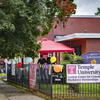Professor Rosenthal along with his colleague, Professor William Perry, developed the Perenthal Planning Model, which was based on their combined experience within the Center and the School for Social Administration. This model became the core for the community development and planning sequence within the Master’s program of the School of Social Administration.
The Center made contributions in the areas of aging, mental health, public housing, child welfare, juvenile justice, violence prevention, child abuse and neglect, adult education, and provided training and technical assistance. The Center has developed workshops, classes, and conferences both nationally and internationally. The Center’s training has included working with various local government agencies and U.S. Departments, and resulted in the development of a series of staff training manuals and videos. The Center also designed and coordinated an Interdisciplinary Post-Baccalaureate Certificate Program in Child Abuse and Neglect.
Under funding by the Department of Education, the Center planned and implemented violence prevention curriculum and leadership training programs for persons in neighborhoods with unusually high levels of violence.
The Center has also been influential in planning and impacting policies throughout the Commonwealth in regards to juvenile justice, child welfare, public housing, and aging. Interest in policies and issues related to aging culminated in the Center assisting in the development of initial proposals to create Temple University’s Institute on Aging.
The Center had been concerned with researching and evaluating programs so that they are better able to meet the real needs of targeted populations. The Center’s research and evaluation efforts have included: programs targeting the elderly; neighborhood organizing on drug and crime prevention (Weed and Seed); pregnancy prevention programming; programs servicing at risk children in schools; Welfare to Work programs; campaigns for increasing awareness of adoption services; and career education programs for youth. The Center has also conducted a city-wide needs assessment for the Mayor's Office of Community Services to identify the needs of low-income Philadelphians and to assist in the strategic planning efforts of city agencies.
The Center was the original publishers of the Professional Development: The International Journal of Continuing Education. This journal provided a forum for national and international subscribers and authors to find out the most recent research and policy formulations for persons within the social work practice field.
In 2012, the School of Social Work moved under the College of Public Health, and the Center for Social Policy and Community Development moved under the Dean's Office under the College of Public Health.
CSPCD Founder/Director Seymour J. Rosenthal - Served from 1969 to 1999
CSPCD Director John H. Trudeau - Served from 1999 to 2007
CSPCD Interim Director Anita Lyndaker - Served from 2007 to 2009
CSPCD Acting Director Thomas Armstrong - Served from 2009 to 2010
CSPCD Director Shirley Moy - Served from 2010 to 2018

